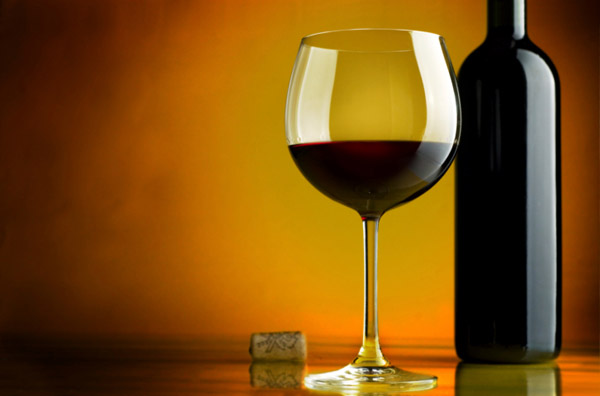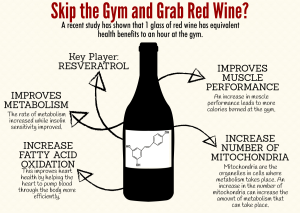
Photo source: http://www.relicsantiquemall.com
‘Tis the season for drinking wine and bubbly to celebrate festive meals and special occasions with family, friends, and dear loved ones. Actually, many folks would argue that every day is a great day to drink a glass of your favorite fermented grape.
Recently, a research study at the University of Alberta has been floating around social media saying drinking red wine, or more specifically, consumption of resveratrol, can serve as a replacement to good old-fashioned exercise.
Of course, I dug a little deeper into the methodology, results, and conclusion of this study.
- The study is not recent. It was originally conducted in 2012.
- Methods. The study was conducted on rats.
- Results.
- Compared to sedentary rats, ET (endurance-type exercise training) alone significantly reduced body weight in rats fed either the standard diet or the diet supplemented with RESV (resveratrol).
- Supplementing diets of sedentary rats with RESV resulted in a significant improvement (∼25%) in exercise performance.
- 12 weeks of ET on its own dramatically increased the endurance of rats compared to sedentary rats. (This is no brainer.)
- Interestingly, compared to ET alone, ET + RESV increased exercise performance a further ∼20% demonstrating that the addition of RESV improves exercise performance beyond ET alone. (so based on this study and this study alone, this means exercising AND drinking wine helps improve endurance training!) (Dolinsky, Jones, et al., 2012)
Say what?
Yes, according to this study (conducted on rats), exercising and drinking red wine as a part of your regular daily diet helps improve endurance training.
What does this mean for you, me,
and the next person trying to live a healthy, active life?
PORTION –
The study does not recommend a suggested daily portion of red wine consumption and the positive health benefits it may have on endurance training.
Several studies conducted by the National Institutes of Health have concluded that drinking a daily glass of red wine may prevent heart disease (Wine and Heart Health, 2015) and decrease blood sugar levels (Daily Glass of Wine, 2015) for Type 2 diabetics. Note, one glass or serving is equated to four ounces.
MULTI-PRONGED APPROACH –
Although, these studies point out the health benefits of a daily 4 ounce glass of wine, it should not be done in isolation of several other healthy lifestyle habits such as,
- Controlling blood pressure and cholesterol
- Exercising and following a low-fat, healthy diet
- Not smoking
- Maintaining an ideal weight (Wine and Heart Health, 2015)
HEALTHY IS AS HEALTHY DOES –
Lastly, we really don’t know if it’s portion-controlled daily consumption of red wine (or any other alcoholic drink) that accounts for increased health benefits in people who drink moderately because they may be healthier than others to begin with.
So, go ahead and sip in moderation, stay hydrated with water, eat healthy, and maintain an active lifestyle!
Cheers!
Bonus Knowledge for all BEER DRINKERS! Check out what the Academy of Nutrition and Dietetics has to say about the benefits of drinking an ice cold beer!
References:
Ansel, K. (2014). Have a Brewski! 5 Ways Beer Can Help Your Health. Academy of Nutrition and Dietetics. Retrieved from, http://www.eatright.org
Daily Glass of Wine May Boost Type 2 Diabetics’ Heart Health, https://www.nlm.nih.gov/medlineplus/news/fullstory_155099.html
Dolinsky, V. W., Jones, K. E., Sidhu, R. S., Haykowsky, M., Czubryt, M. P., Gordon, T. and Dyck, J. R. B. (2012), Improvements in skeletal muscle strength and cardiac function induced by resveratrol during exercise training contribute to enhanced exercise performance in rats. The Journal of Physiology, 590: 2783–2799. doi:10.1113/jphysiol.2012.230490
No author. (2015). Wine and Hearth Health, https://www.nlm.nih.gov/medlineplus/ency/article/001963.htm

